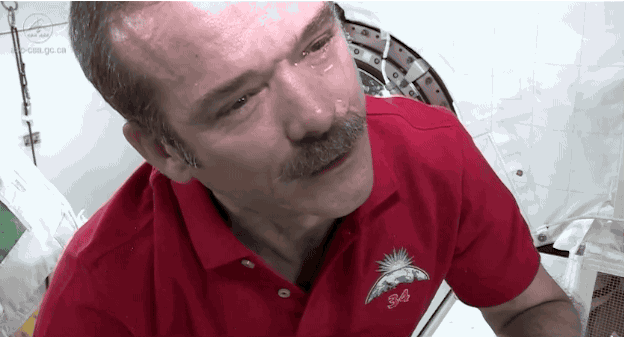Tearing Up
Getting soap in your eye stings. That’s something we unfortunately learn at an early age — anyone with children has certainly seen a youngster freak out a bit when a drop of shampoo gets in his or her eyes. The good news is that the pain is typically fleeting, as our bodies have natural defenses which remove the intruding chemicals. These defenses are known as tears, of course, and they’re almost always sufficient. But in 2011, a man named Andrew Feustel got some soap in his eyes and the tears weren’t helping. There was a good reason for this.
Feustel was in space.
In May of 2011, Feustel, a geophysicist, was on a spacewalk, one of the six he’d have during his NASA career. As reported by the Associated Press, this one got off to a less-than auspicious start. He radioed back to his crewmate, Mike Fincke, “Just an FYI, my right eye is stinging like crazy right now. It’s watering a lot. Must have gotten something in it.” The “something,” it turned out, was an anti-fogging solution that the AP described as “essentially off-the-shelf dishwashing soap.” Like happens on Earth, Feustel had gotten some soap in his eye and he started tearing up. But unlike on Earth, the tears didn’t just roll down the spacewalking astronaut’s face. The Washington Post explained: due to the low gravity, the tears “don’t fall off of your eye . . . they kind of stay there.”
Canadian astronaut Chris Hadfield, who recently completed a nearly six-month stay aboard the International Space Station, demonstrated this in a video (here) by taking a pouch of drinking water and spouting some near his eye. And as seen in the animated gif below, the water doesn’t go very far. (The image below loops, so it looks like the water is going up and down, but it really just sloshed around a lot. The video may be more clear.)

For Feustel, this caused a major problem — the irritation in his eye was likely to get worse, not better, as the tears weren’t likely to do any good. (If anything, there’s a good chance they’d make the problem worse.) Thankfully, Feustel found a solution. His helmet was outfitted with a foam block, intended to clean his ears as need be; he used it to blot the water (and soap) off his eyes. He was able to complete the spacewalk as planned.
Bonus fact: Tears aren’t the only problem water has in a low gravity environment. A few weeks after releasing the YouTube video linked above, Hadfield released another one demonstrating what happens when you wring out a wet washcloth in space. Like the tears, the water from the washcloth doesn’t go very far. Instead, as seen here, it floats around the washcloth, creating a tube of sorts, which ends up rolling onto the astronaut’s hands.
From the Archives: The Best ICU in the Universe: What happens when you have a heart attack in space?
Related: #GoodMorningEarth: A Kindle e-book on Chris Hadfield’s time commanding the ISS.
